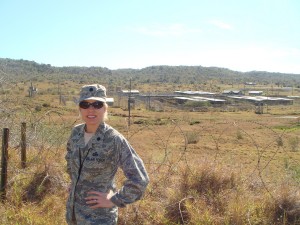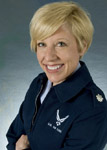 It is hard to believe I have been in military public affairs – the military’s version of PR – for almost two decades. I joined the Air Force Reserve in college and along the way was commissioned as an officer. Just like in the 1990s, today’s public affairs field is very exciting.
It is hard to believe I have been in military public affairs – the military’s version of PR – for almost two decades. I joined the Air Force Reserve in college and along the way was commissioned as an officer. Just like in the 1990s, today’s public affairs field is very exciting.
What exactly do I do? Right now I am assigned as a Reservist to the Pentagon, serving in a public affairs role with the office of the Secretary of the Air Force – Public Affairs. My immediate role is to support the outreach, opinion and engagement division.
My primary job for the last couple of months has been working on media training for high-level defense and federal officials. I develop training scripts, play the role of reporter and help with scheduling (this is all in addition to my full-time teaching job in Wisconsin). My favorite part of this job is playing the role of a reporter live from a remote location in New York. The trainee cannot see me, so it can be quite challenging. We provide feedback, offer other scenarios and give the trainees a video of everything that occurred. The Air Force has a very comprehensive media training program at the Pentagon – it shares the same tech qualities and capabilities of regular TV.
But PA – as we call public affairs – is not limited to media training. For many years, I served as the director of public affairs at an Air Force wing. I was responsible for community relations (tours, special events, and outreach), internal communications (employee newsletters and related communications), media relations and congressional relations. As a part-time employee, I had a lot of fun and gained exceptional experience. We managed a variety of projects, ranging from military balls to Presidential visits.
More recently, I have been involved in the Reserve’s social media strategy and have supported special projects like Tour for the Troops. In the Tour for the Troops, I executed the social media plan for Air Force Reserve as we flew Kid Rock around to various concerts in the war zone. Now THAT was interesting!
It is also important to note that you do not have to wear the uniform or join the military to do public affairs. The different branches of service have hundreds of opportunities to work as a civilian in PA. Of course, as a civilian, you are less likely to deploy to remote places.
If I had to identify when my role really transformed, it would be 9/11. Ten years ago, my military job changed significantly, as did the “ops tempo” or rate we were supporting the active duty Air Force. Suddenly, we were helping activated Reservists, managing multiple media requests, honoring returning Airmen and Soldiers and executing other wartime activities in addition to our regular work. I was also activated – or deployed – three times in the last five years. I completed two tours in Southwest Asia, where we have a large base flying daily missions into Iraq, Afghanistan and Africa. I served as the Pentagon’s spokesperson for the Guantanamo Bay War Court in my most recent tour. Throughout these experiences, I have made the greatest friends of my life. After sacrificing and facing daily uncertainty with my brothers and sisters in arms, we cannot help but become closer because of the trust needed in a mission. I love this aspect of the military.
I love the Air Force, and cannot say enough positive things about my experience in the Reserve. I have worked in more than 20 different countries, met lifelong friends and mastered tough communication skills. The Reserve has also given me priceless education and extra income. There is room for more public affairs officers and civilians – the military can be a fabulous career.
It is not a piece of cake, though. On those days that seem especially hard or challenging, I always remember this quote: “If it was easy, everyone would do it.”
 Lt. Colonel Ann Peru Knabe, APR+M, Air Force Reserve Public Affairs Officer
Lt. Colonel Ann Peru Knabe, APR+M, Air Force Reserve Public Affairs Officer
Knabe is a dynamic change-agent in public relations. She believes innovation and progressive thinking are keys to survival in today’s competitive global PR environment. Her 20+ years in military public affairs and international NATO settings leverage her civilian and educational experiences. Knabe is a “relationship-builder,” referring to her extensive work in media relations, internal communications, social media, community relations, international public affairs and congressional relations.


